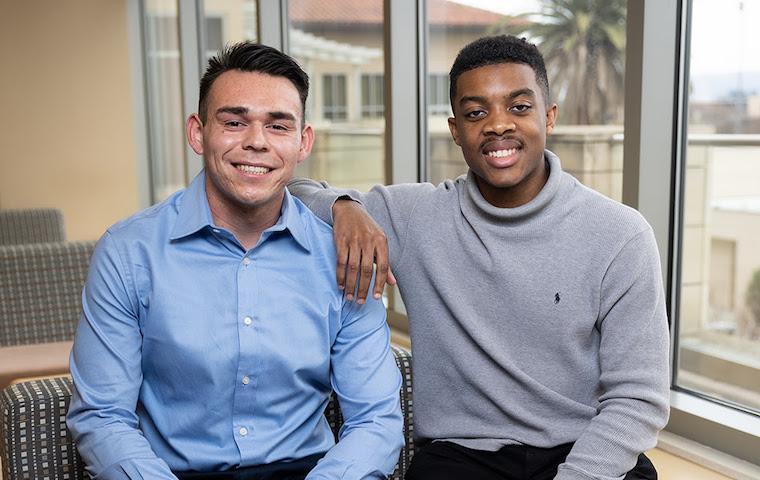Leading Together

Finance majors Darius Johnson ’23 and Jacob Mejia ’24 are smart, driven, and dynamic.
They’re also in a hurry.
From Leavey business courses to campus investment clubs to summer internships at Goldman Sachs, their Santa Clara experiences have inspired and reinforced each other's goal to make the world of private equity their future.
It’s a brighter one, they say, because of LEAD Scholars, Santa Clara’s program for first-generation students. After all, it’s how the friends met and how Johnson began mentoring Mejia in the realm of finance.
Johnson was Mejia’s peer mentor when the first-year student arrived in September 2020 for LEAD’s annual fall orientation, held the week before Santa Clara’s fall quarter starts. They quickly discovered a shared passion for learning about investing, private equity, and venture capital. It was Johnson, a former intern at both Sumeru Equity Partners and Goldman Sachs, who would later counsel his mentee Mejia to do the same.
Making things happen
LEAD co-founder and director Erin Kimura-Walsh ’98 delights in the duo’s bond and enthusiasm, and the ways in which “they just go out and do things and make things happen.
“At Santa Clara, you hear their names from all different sorts of people who aren’t necessarily related to LEAD,” she says. “They’re making an impact throughout our whole campus community.”
Their story isn’t an unfamiliar one. In fact, mentorship is essential to Leadership Excellence and Academic Development, aka LEAD. The innovative SCU initiative, which is celebrating its 20th anniversary this year, has graduated over 1,000 first-generation college students, generally defined as students with parents who did not graduate with a four-year degree. They may be the first person in their family to do so.
Today, the LEAD Program serves approximately 10 percent of Santa Clara’s undergraduate student body through a comprehensive suite of strategies that support LEAD students with their transition to SCU, ensure they thrive on campus, and enhance their success beyond college. Like Johnson and Mejia, most receive financial aid or scholarships.
Johnson, whose mother immigrated from Jamaica to Chicago, says LEAD not only helped him navigate the ins and outs of college, it also introduced him to a core group of first-gen friends and mentors who are cheering him on as he prepares to start a full-time job this fall at Insight Partners, the New York City VC firm where he interned last summer.
“The classroom is great; you learn right there,” says Johnson. “But the people you meet, whether it’s through finance clubs, networking, or even making cold calls—it all helps in the entrepreneurial world.”
A new direction
Teamwork is nothing new for Johnson, who dreamed of playing college football until a broken femur ended the former high school quarterback’s gridiron career. He always got good grades, but he's taken his competitive spirit to the business world in a way that has changed the direction of his life.
Johnson was assigned a half dozen LEAD Scholars just like other mentors who are matched with new first-year and transfer students as they arrive at SCU. In addition to coordinating activities during the LEAD orientation, mentors meet at least once a quarter with their mentees, and once a quarter with their group. Since their professional paths were so similar, Mejia and Johnson have continued to touch base more often.
Whereas a student whose relatives went to college would get advice from a parent or sibling, first-generation students usually don’t have that luxury. Johnson played that role for Mejia, encouraging him to join student-run groups like the Santa Clara Investment Fund, where undergrads learn how to research industries, analyze companies, make presentations, and bone up on professional development skills. He also suggested Mejia apply for internships from which Johnson himself had benefited.
“Darius is a great source to go to based on his knowledge and the level of understanding he has for the professional world,” recalls Mejia, a grandson of migrant farm workers and day laborers. He starts an internship at Goldman Sachs in New York City this summer.
‘This is how you succeed’
Inspired by his friend, Mejia has become a LEAD peer mentor as well. “I want to help these kids understand that I know what their situation is, that I know what it’s like. And this is how you do it. This is how you succeed.’”
He calls it “standing on the shoulders of generations who came before me,” including his parents and grandparents who never made it to college.
Yet their hard work always inspired him. Growing up in the East Bay, Mejia says his business curiosity was initially piqued after his dad’s job as a boom mic operator for local news stations led him inside the office buildings of tech giants like Google.
“He would come home and say, ‘You should look up this company!”’ recalls Mejia, who was obsessed with tech, coding, and software until one day in high school, he wondered how the companies got funded. Finance has been his main focus ever since, leading to the serendipitous meeting with Johnson, who was equally enthralled with the subject.
“My friendship with Darius was the single biggest connection I’ve ever made in my life,” says Mejia. “That’s when it all started making sense in my head. He talked about how, if I wanted to get started and go into this, I would need to do this, and do that. Darius is a mentor to me—and I will thank him forever.”
Open to both first-year and transfer students, LEAD offers first-generation college students the support and resources they need to find academic success, community engagement, and vocational exploration.